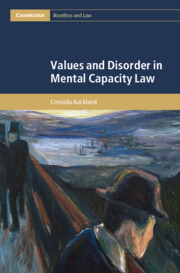Book contents
- Values and Disorder in Mental Capacity Law
- Cambridge Bioethics and Law
- Values and Disorder in Mental Capacity Law
- Copyright page
- Dedication
- Contents
- Acknowledgements
- Cases
- Statutes
- Introduction
- 1 A Value-Neutral Understanding of Capacity
- 2 An Essential Role for Values in Assessments of Capacity
- 3 Why Disorder Matters
- 4 Accommodating Values in the Test of Capacity
- 5 Reflecting Ambiguity on the Cusp of Capacity
- 6 Softening the Capacity Cliff Edge
- Conclusion
- Appendices
- Book part
- Bibliography
- Index
- Cambridge Bioethics and Law
6 - Softening the Capacity Cliff Edge
Published online by Cambridge University Press: 25 October 2024
- Values and Disorder in Mental Capacity Law
- Cambridge Bioethics and Law
- Values and Disorder in Mental Capacity Law
- Copyright page
- Dedication
- Contents
- Acknowledgements
- Cases
- Statutes
- Introduction
- 1 A Value-Neutral Understanding of Capacity
- 2 An Essential Role for Values in Assessments of Capacity
- 3 Why Disorder Matters
- 4 Accommodating Values in the Test of Capacity
- 5 Reflecting Ambiguity on the Cusp of Capacity
- 6 Softening the Capacity Cliff Edge
- Conclusion
- Appendices
- Book part
- Bibliography
- Index
- Cambridge Bioethics and Law
Summary
This chapter will explore how the provisions governing best interests assessments ought to be reformed so as to better ensure that an agent’s authentic desires are being prioritised in decisions being taken about them. The starting point should be that the assessor ascertains ‘so far is reasonably practicable’ the individual’s wishes, feelings, beliefs, and values. This should then be supplemented by a presumption that the agent’s wishes and feelings will be determinative of what is in their best interests, except when giving effect to them will expose the person to a risk of significant harm. Even where the harms are significant, however, there will still be occasions where the agent’s wishes and feelings should nonetheless take precedence; where to do otherwise would involve frustrating their deeply and authentically held beliefs, values, or commitments. This chapter will highlight some of the potential considerations which ought to guide assessors in these circumstances. It will propose that assessors be provided with a list of factors that they must take into account when determining the degree of weight to be ascribed to the agent’s wishes, which reflect these considerations.
Keywords
- Type
- Chapter
- Information
- Values and Disorder in Mental Capacity Law , pp. 226 - 272Publisher: Cambridge University PressPrint publication year: 2024

